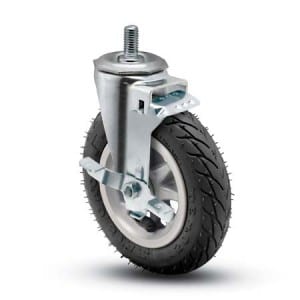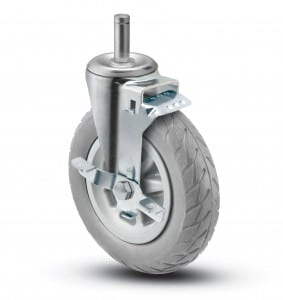 Understanding the Term Pneumatic
Understanding the Term Pneumatic
The term pneumatic is often used in regards to describing a certain technology that is used in industrial, mechanical and construction environments. Simply, pneumatic technology refers to a system in which inert compressed gases is used in some manner so as to allow the user to do more with less manual power, thereby increasing efficiency. Pneumatic power like hydraulic power, allows more power to be transferred in a smaller amount of space because it uses another substance and or material in addition to the original parts to transfer power. Because pneumatic refers to a technology that utilizes compressed inert gases, one of the easiest things to visualize is an air-filled caster wheel. Due to its usefulness, in even these small applications, pneumatic technology is being utilized in many different industries.
What is the Difference?
Pneumatic casters are made with similar parts as other casters, having the caster wheel housing and attachment mechanism and wheel. The difference between regular casters and pneumatic casters is that the wheels on pneumatic casters are filled with a compressed inert gas. Due to the slightly difference pneumatic casters do have different features that need to be considered. Due to the fact that the wheels are filled with air, they often sit a little higher than other casters. This feature allows the item being moved to have a smooth and therefore, more quiet ride over different types of terrain. Due to the potential difference in height, this is a detail that needs to be taken into consideration when ascertaining the overall height of the equipment or furniture to be placed on the pneumatic casters. This is one example of the individual characteristics that needs to be taken into consideration when deciding whether or not pneumatic casters are the right casters for the specific job and conditions in which you are working.
Other Options
Whether you are deciding to use pneumatic casters for the first time, or deciding whether or not to replace them with the same type there are other options to consider. Another option to consider, if you are looking at different types of casters, is the semi pneumatic caster. Semi-Pneumatic caster wheels have a slightly different design, although the overall look is similar. The difference between regular pneumatic and semi-pneumatic caster wheels is, that pneumatic caster wheels have compressed air inside the tire, whereas semi-pneumatic caster wheels they have an extra thick tire that is made of a soft yet solid rubber that is an industrial plastic center.
Comparing Pneumatic to Semi-Pneumatic
As with any different type of caster, there are always things to consider when it comes to looking at design in comparison to usage and what will make the most appropriate fit. In some ways semi-pneumatic wheels may be less durable than regular pneumatic wheels; however, they also offer features that regular pneumatic wheels do not. With semi-pneumatic caster wheels the actual wheel is a solid material, not filled with air and therefore eliminates the worry of deflation. Additionally, it is important to note that semi-pneumatic wheels can aid in reducing the movement from vibration that may result from floors and terrain that are not smooth. Semi-pneumatic caster wheels should not be used on gravel or sand, however they may be used on surfaces such as grass. Yet another notable characteristic is semi-pneumatic caster wheels have a smaller footprint than regular pneumatic caster wheels. Despite this difference, semi-pneumatic caster wheels often have a greater capacity.
After taking into consideration both regular pneumatic and semi-pneumatic casters, you may find that there are still some areas of need in which you feel a different type of caster may be better suited. In this case it may actually be beneficial to consider the large variety of standard caster options. Generally speaking casters are available in three different weight categories, light, medium and heavy. This division of categories is in reference to the individual weight bearing load capacity of the caster as opposed to the actual weight of the caster itself. However, as is generally true, in order for the caster to be able to support more weight it is often made of a material that weighs more itself. After looking at this first general category division, there are still many more specific characteristic and details to consider when choosing the best caster for the specific job.
Important Details to Consider
In addition to carefully considering the weight load capacity that you will need, other things to consider is how the caster will be attached to the item that needs to be made mobile, thereby determining the attachment mechanism. What type of floor or terrain the item will be required to traverse and the fragility of the item being moved will help you to consider which wheel material type would be best suited for the job. Additionally, depending on the specific environment, you may want to consider both aesthetics and sound quality. Certain areas need to maintain a certain visual aesthetic for business purposes and therefore there are different choices for metal finishes and materials of both the caster housing and the wheel itself. Some businesses or locations may have concerns about sound, and therefore it is important to understand that some materials can be either more quiet or more loud depending on the floor type they are required to interact with. All of these details can aid in choosing the caster wheel that is not only best suited, but that will have a long life-span, thereby cutting down on the need for early replacement.
We at Douglas Equipment, with more than fifty years of experience in the industry know and understand the difficulty in understanding all the details needing to be considered to make the best choice. We pride ourselves in helping you to make a decision that you can be confident with.
Please contact us Toll-free at 1-800-451-0030, locally at 305-888-3700, or by faxing us at 305-883-9563. We can also be reached electronically through the Contact Us section. We look forward to helping you choose the best caster for the job.





